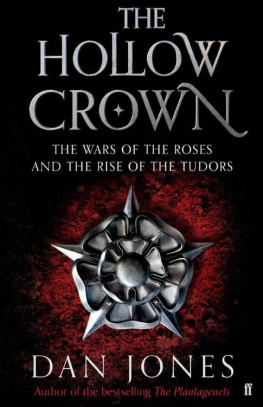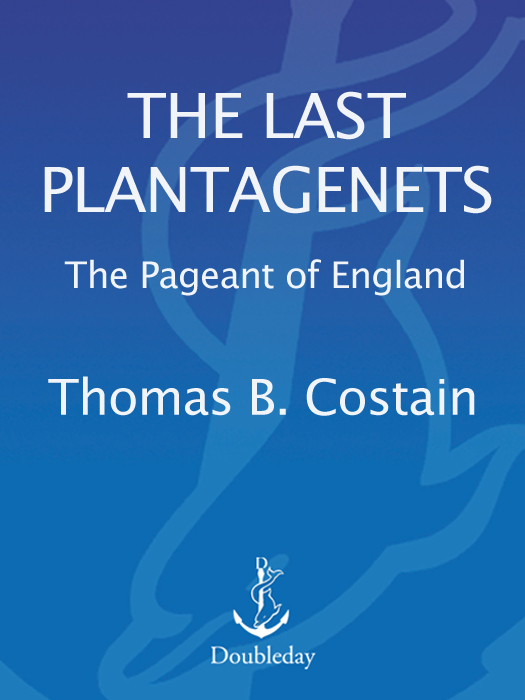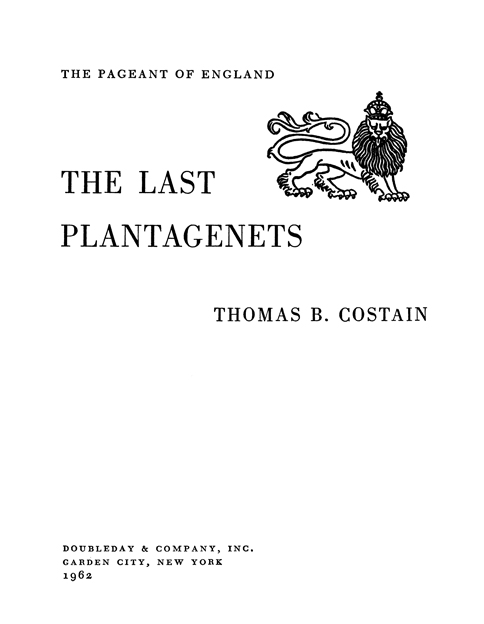BOOKS BY THOMAS B. COSTAIN
THE LAST PLANTAGENETS :
The Pageant of England
THE CHORD OF STEEL
THE DARKNESS AND THE DAWN
THE THREE EDWARDS :
The Pageant of England
BELOW THE SALT
STORIES TO REMEMBER
(with John Beecroft)
MORE STORIES TO REMEMBER
(with John Beecroft)
THE TONTINE
THE MISSISSIPPI BUBBLE
THE WHITE AND THE GOLD :
The French Regime in Canada
THE SILVER CHALICE
THE MAGNIFICENT CENTURY :
The Pageant of England
SON OF A HUNDRED KINGS
THE CONQUERORS :
The Pageant of England
HIGH TOWERS
THE MONEYMAN
THE BLACK ROSE
RIDE WITH ME
JOSHUA: A BIOGRAPHY
(with Rogers MacVeagh)
FOR MY GREAT FOLLY
LIBRARY OF CONGRESS CATALOG CARD NUMBER 627616
COPYRIGHT 1962 BY THOMAS B. COSTAIN
ALL RIGHTS RESERVED
eISBN: 978-0-307-80955-1
v3.1
CONTENTS
PART ONE
THE KING WHO LOST A SHOE
CHAPTER I
A Prince Is Born
1
A PRINCE was born to the royal line of England on January 6, 1367, in the abbey of St. Andr at Bordeaux and given the name of Richard. His mother, who had been a widow when she dazzled and cajoled the seemingly impervious bachelor, Edward the Black Prince, into marrying her, had no doubts at all that the boy was the most beautiful baby ever born in a royal bed and then laid to sleep in an ermine-lined cradle. Somewhat limp and exhausted after the ordeal of motherhood, for she was thirty-nine years old, she gazed through her window at the highest spire in all France, that of St. Michel, and the thought may have been in her mind that she herself had climbed to an equal height. She had done her duty and now none of the sly councilors of the old king nor the sour dowagers of the court at Westminster could have anything more to say. She would soon be the Queen of England and, after that, she would see a son of hers on the throne.
It should be told that, after her marriage to Prince Edward in the face of parental disapproval, the vivacious Joan (who is called in history the Fair Maid of Kent) and her somewhat taciturn husband had been glad to get away from the frowns and fogs of London to settle down to the government of the Aquitanian possessions in this beautiful city where the sun shone all the year round, or nearly all, and the plane trees sighed in the cool breezes from the sea, and life was very romantic and very gay. Three years earlier a son had been born to them and named Edward, who was the apple of his great fathers eye. Now, with the arrival of little Richard, who was to become known as Richard of Bordeaux, the succession was assured.
The father of the new arrival shared this satisfaction, but it was not his custom to unbend and so he had little to say as he towered above the cradle. Lying very still, his face neither wrinkled nor mottled in the way of newly borns but pale and handsomely composed, Richard gave the impression of being delicate enough to be wafted away by any careless whisk of a midwifes arm. His father may have been disappointed in one respect, for what he most admired in male children was the promise of massive thews like his own or the strong frame of his great-uncle Richard (four times removed), who had been called the Lion-hearted. Would this undeniably beautiful boy prove to be of stout heart? Would he have a firm seat in the saddle to ride the shocks of conflict? Such thoughts must have been in the fathers mind, for he began at once to make plans for a Spartan upbringing. Richards lullabies must be the ballads of chivalry, his toys must be swords and bows, his tutors must not be learned priests but the stoutest of warriors.
The court at Bordeaux was acknowledged to be the most brilliant in Europe and, at the moment when the second son arrived, it was crowded with visitors. King James of Majorca had arrived to act as chief sponsor, and Pedro of Castile was there with Constance and Isabella, the two daughters born to him by a mistress. Pedro, who was called The Cruel, had been removed from the throne by his angry subjects, led by an illegitimate brother, Henry of Trastamara. The purpose of Pedros visit to Bordeaux was to solicit the aid of the great English warrior in winning back his crown, and the Black Prince had decided to take the adventure in hand, although he was in poor health and seemingly incapable of conducting a vigorous campaign. Edwards reasons for taking this rash step, which would plunge him deep into debt, were typical of this grandly aloof and determined prince. He would fight for a brother knight or undertake the rescue of a degenerate king like Pedro even if it cost the lives of thousands of common men and hopelessly entangled his affairs at home. For the benefit of his councilors, all of whom seemed opposed to the step, he had written: I do not think it either decent or proper that a bastard should possess a kingdom as an inheritance, nor drive out of his realm his own brother, heir to the throne by lawful marriage; and no king or kings son ought ever to suffer it as being of the greatest prejudice to royalty. He had other reasons, but this was enough to indicate how his mind worked. His plans for the organization of an army to march down through the Valley of Roncesvalles into Spain were already complete and he, Edward, planned to leave for Dax in a matter of days.
The arrival of little Richard of Bordeaux was, therefore, badly timed. Back of the stern faade with which he faced the world, the Black Prince was concerned with problems of equipment and provisions and not with this frail son that his plump, middle-aged wife had added to his other and greater responsibilities. The event, nevertheless, was to create a considerable stir. A hum of excited talk started the instant the prince stalked into his wifes chamber, accompanied by his two royal visitors. It was true that James of Majorca was a mere cantlet of a king (he also had been shoved off his miniature throne and was seeking aid) and Pedro the Cruel was a fugitive from his Spanish dominions. Neither visitor was a wise man and that adjective was not one to be applied loosely to the Black Prince. But there were gifts in the hands of all three; and was it not Twelfth Night? Byr Lady, here was the scene at Bethlehem repeated! Everyone at court, and later throughout the civilized world, knew this meant that the child would become a man of greatness and power and that his deeds would resound throughout Christendom.
The prince acted promptly because he had not more than a few hours left before he started on his costly and injudicious Spanish adventure. He announced that two of his favorite campaign companions, Sir Guichard dAngle and Sir Simon Burley, would share the tutoring of the little prince as soon as the promises to the ex-King of Castile had been fulfilled. They were both held in high esteem by all men, but the appointment was destined to provide the link in a chain of events that would involve the little prince in disastrous conflicts in the years to follow.
2
A ray of light can sometimes be turned on blank periods in history through events which follow after. Little is actually known of the early boyhood of Richard of Bordeaux, but certain conclusions may reasonably be drawn from subsequent developments. During the four years at Bordeaux he was in his mothers care and the bond of affection between them was maintained until the last sad days that the Fair Maid of Kent spent on earth. This needs no documentary proof, for all the men were off to the wars, the Black Prince himself, such of his brothers as were in France, and all of his knights and attendants, including the gallant and gentle Sir John Chandos, who always rode beside him, and the two favored companions already appointed as the boys tutors. From his brief contacts with his father later, and the things he learned about that unbending parent, Richard absorbed ideas which were prevalent enough in all branches of royalty but were not likely to form a good character foundation for a future king. From the atmosphere of the court he also developed other tastes which, though admirable in themselves, were not likely to fit him for the task of handling the proud but unlettered baronage of England.




